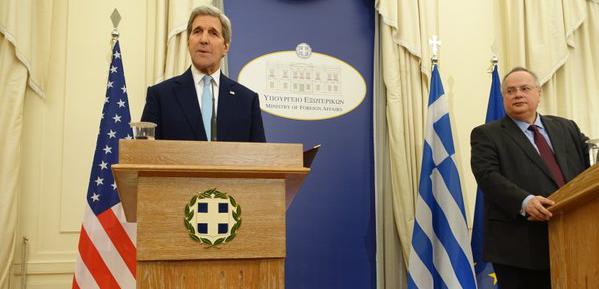US Secretary of State John Kerry, in Athens today for meetings with Greek Prime Minister Alexis Tsipras and the Foreign Minister Nikos Kotzias, reiterated Washington’s support for the TAP (Trans Adriatic Pipeline) and IGB natural gas pipeline projects during a joint news conference with Kotzias, his Greek peer.
The TAP pipeline will run through Greece to carry Azeri natural gas into Europe. The IGB gas pipeline will interconnect the Greek and Bulgarian systems.
The American diplomat made note of Greece’s rising role in European energy security, while stressing energy diversification represents a common objective for both the US and its European partners.
Kerry praised the resilience of the Greek people and declared the US is supporting Greece’s path towards economic recovery.
The US Secretary of State, who had met with the Greek prime minister prior to the news conference, noted Tsipras expressed a strong interest for foreign investments in Greece. Kerry promised to relay this message to the investment community abroad.
Kotzias, Greece’s Foreign Minister, spoke of the strong traditional ties shared between Greece and the USA, decribed Kerry as a very formidable Secretary of State, while adding that the Greek diaspora in the US serves as a bridge linking the two nations.
The Greek minister also acknowleged the helpful contribution offered by the US to Greece in the country’s negotiations with lenders.
The US is interested in supplying Europe with LNG shale gas. Greece and Croatia, among others, are planned to serve as distribution points in this initiative.
Work is underway to increase the capacity of Greece’s exisiting LNG terminal station in Revythoussa, an islet in the Saronic Gulf, close to Athens. The construction of a second Greek LNG station in Alexandroupoli is of even more crucial importance to the US supply plan for Europe. The facility would be connected to the IGB pipeline and, besides Greece, would supply American LNG to the Bulgarian market as well as other countries in the region, all currently heavily dependent on Russian gas.





